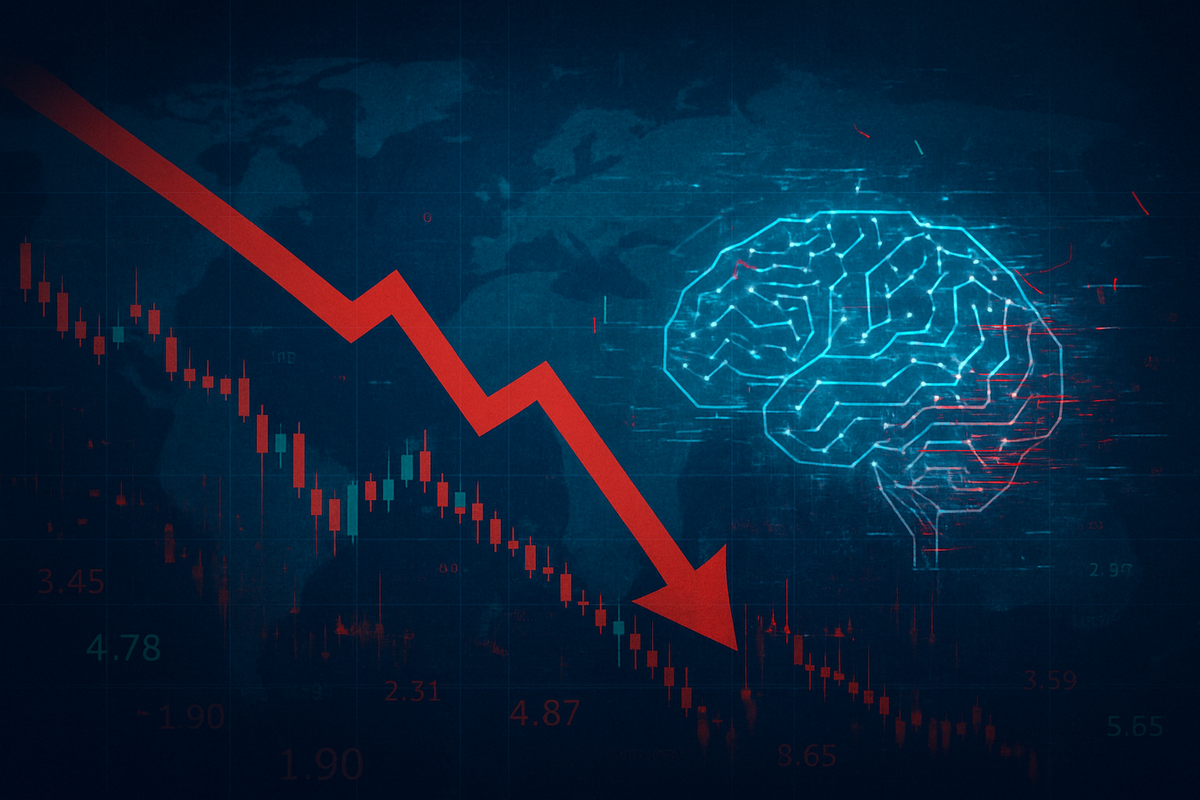
Global stock markets are currently experiencing a significant and broad-based selloff, with investors pulling back from equities across Asia, Europe, and the United States. The primary catalysts for this downturn are mounting "AI jitters" and growing concerns over "AI valuations," as market participants question the sustainability of the rapid growth seen in artificial intelligence-related companies. As of November 18, 2025, the apprehension surrounding a potential "AI bubble" has intensified, leading to a palpable shift in investor sentiment towards a "risk-off" stance, impacting everything from tech giants to cryptocurrencies. This widespread correction is forcing a re-evaluation of market fundamentals and the long-term prospects of the AI revolution.
The AI Valuation Reckoning: A Global Market Downturn
The current global stock market selloff, which gained significant momentum leading up to and including November 18, 2025, is primarily characterized by a sharp decline in technology stocks, particularly those heavily invested in or associated with artificial intelligence. The underlying concern among investors is that many AI-linked companies, despite their innovative potential, have seen their valuations soar to unsustainable levels, creating an "AI bubble" akin to the dot-com era.
The timeline of events leading to this moment has been building for several months, with a consistent narrative of exponential growth in AI stocks met by intermittent warnings from financial analysts and economists. A recent Bank of America survey highlighted the depth of this concern, revealing that 45% of global fund managers now consider an AI bubble to be the top market risk, surpassing traditional worries like bond market instability or inflation. This sentiment has been exacerbated by reports indicating that a vast majority (95%) of surveyed AI developments have yet to turn a profit, despite massive investments, fueling parallels to the speculative frenzy of the late 1990s. Even prominent figures like Alphabet (NASDAQ: GOOGL) CEO Sundar Pichai have acknowledged a degree of "irrationality" in the AI boom, suggesting no company is "immune" to a potential bubble burst.
Key players and stakeholders involved in this selloff include the major technology companies often referred to as the "Magnificent Seven" – Nvidia (NASDAQ: NVDA), Amazon (NASDAQ: AMZN), Apple (NASDAQ: AAPL), Microsoft (NASDAQ: MSFT), Tesla (NASDAQ: TSLA), Alphabet (NASDAQ: GOOGL), and Meta Platforms (NASDAQ: META). These companies, which have largely driven market gains over the past year, are now experiencing significant corrections. Nvidia, a critical chipmaker whose performance is often seen as a bellwether for the AI sector, has seen its shares fall by over 10% in November, officially entering "correction" territory. Palantir Technologies (NYSE: PLTR), another significant AI player, also experienced a sharp decline of almost 8%. Noted short-sellers, including Michael Burry of "The Big Short" fame, have reportedly placed substantial bets against both Palantir and Nvidia, further intensifying bearish sentiment.
The initial market reactions have been swift and widespread. Major indices across the globe have registered significant declines, dropping to one-month lows in many cases. In the US, the Nasdaq Composite, S&P 500, and Dow Jones Industrial Average have all been impacted. Asian markets, including Japan's Nikkei 225, South Korea's Kospi, and Hong Kong's Hang Seng, have followed suit. European exchanges, such as the UK's FTSE 100, Germany's DAX, and France's CAC 40, have also seen substantial losses. The Cboe Volatility Index (VIX), often called the "fear index," has jumped significantly, reflecting heightened investor anxiety. Furthermore, the selloff has spilled over into riskier assets like cryptocurrencies, with Bitcoin falling below $90,000, erasing its year-to-date gains after reaching nearly $125,000 just last month. Compounding the market anxiety are fading expectations for a US interest rate cut in December and broader economic concerns, including weak Chinese economic data and the impact of the longest federal government shutdown in US history. All eyes are now on Nvidia's upcoming earnings report on Wednesday, November 20, 2025, which is anticipated to be a pivotal event in shaping the future trajectory of AI-linked stocks and potentially the broader market.
Navigating the Volatility: Winners and Losers in the AI Correction
The current global stock market selloff, driven by "AI jitters" and valuation concerns, is creating a clear distinction between potential winners and losers in the technology and broader market landscape. Companies with robust fundamentals, diverse revenue streams, and a clear path to profitability in their AI ventures may emerge stronger, while those with inflated valuations, speculative business models, or heavy reliance on future, unproven AI monetization could face significant headwinds.
Among the potential losers are companies whose stock prices have been driven primarily by speculative enthusiasm for AI rather than tangible financial performance. Smaller, less established AI startups that have yet to demonstrate profitability or sustainable business models are particularly vulnerable to a market correction. Their access to capital, which has been abundant during the AI boom, may become restricted as investors become more risk-averse. Furthermore, some of the "Magnificent Seven" – while still powerful entities – could see continued pressure on their AI-driven segments if investor confidence in their future growth projections falters. For instance, companies like Tesla (NASDAQ: TSLA), which has significant AI aspirations in autonomous driving, could be impacted if the market demands more immediate and quantifiable returns from its AI investments.
On the other hand, some companies might emerge as relative winners or at least demonstrate greater resilience. Established technology giants with strong balance sheets, diversified product portfolios, and a proven track record of innovation are better positioned to weather the storm. Microsoft (NASDAQ: MSFT) and Alphabet (NASDAQ: GOOGL), with their extensive cloud infrastructure (Azure and Google Cloud) and enterprise AI solutions, may see sustained demand as businesses continue to adopt AI, albeit with a more cautious approach to spending. Companies like Apple (NASDAQ: AAPL), known for its strong consumer ecosystem and hardware, might also be more insulated from the direct impact of AI valuation concerns, even as it integrates AI into its products. Furthermore, companies that provide essential, foundational components for AI – such as certain semiconductor manufacturers beyond just the highly-valued Nvidia (NASDAQ: NVDA) – could see continued demand, especially if their valuations are more grounded. Infrastructure providers, cybersecurity firms, and companies offering AI solutions that deliver immediate, measurable ROI to businesses might also fare better. The correction could also benefit value investors who have been waiting for more reasonable entry points into high-quality AI companies.
Ultimately, the impact on individual companies will depend on several factors: their current valuation relative to their earnings and growth prospects, their ability to demonstrate tangible returns from AI investments, their overall financial health, and their strategic agility in a more scrutinizing market environment. Companies that can articulate a clear, profitable path for their AI initiatives and avoid purely speculative ventures will likely be better positioned to navigate the current volatility.
Broader Implications: A Reality Check for the AI Revolution
The global stock market selloff, fueled by "AI jitters" and concerns over "AI valuations," represents more than just a temporary market correction; it signifies a crucial reality check for the broader AI industry and the wider financial ecosystem. This event fits into a broader industry trend of technological innovation experiencing periods of intense hype, followed by a more sober assessment of practical applications and profitability. While AI's transformative potential remains undisputed, the market is now demanding concrete evidence of its economic viability rather than just speculative growth.
The ripple effects of this selloff are likely to be far-reaching. Competitors within the AI space, particularly those that have not yet achieved scale or profitability, will face increased pressure to demonstrate tangible value. Funding for early-stage AI startups may become scarcer, leading to a consolidation within the industry as weaker players are acquired or fail. Partners in the AI supply chain, from data providers to specialized software developers, could also experience a slowdown in demand if major tech companies scale back their most ambitious or speculative AI projects. Beyond the tech sector, businesses across all industries that have heavily invested in AI solutions might face renewed scrutiny on their ROI, potentially slowing down the pace of AI adoption in some areas.
Regulatory and policy implications are also likely to emerge from this period of market introspection. Concerns over "AI ethics," "data privacy," and the potential for "monopolistic power" among leading AI firms have been growing. A market correction could intensify calls for greater oversight, potentially leading to new regulations aimed at ensuring fair competition, responsible AI development, and transparency in AI algorithms and data usage. Governments, already grappling with how to regulate rapidly evolving AI technologies, might find renewed impetus to act, especially if the market volatility is perceived to have systemic risks.
Historically, this event draws parallels to the dot-com bubble burst of 2000. During that period, internet companies with little to no revenue saw their valuations skyrocket, only to crash spectacularly when investors realized the lack of sustainable business models. While AI's underlying technology is arguably more fundamental and impactful than many of the dot-com ventures, the pattern of speculative investment followed by a "valuation correction" is strikingly similar. Another comparison can be made to the "crypto winter" periods, where speculative assets experienced significant downturns after periods of rapid growth. These historical precedents suggest that while the underlying technology often survives and thrives in the long run, the initial investment frenzy often leads to a painful recalibration of market expectations. This current selloff is a reminder that even revolutionary technologies are subject to the fundamental laws of economics and investor scrutiny.
The Path Forward: Navigating a Maturing AI Landscape
Looking ahead, the global stock market selloff driven by "AI jitters" and "AI valuations" sets the stage for a more discerning and potentially more sustainable phase of the AI revolution. In the short term, markets are likely to remain volatile, especially around key earnings reports from major AI players like Nvidia (NASDAQ: NVDA). Investors will be closely watching for signs of stabilization, clear guidance on future profitability, and any shifts in central bank policy regarding interest rates, which could further influence market sentiment. We could see continued pressure on high-growth, high-valuation tech stocks, and a rotation towards more value-oriented or fundamentally strong companies.
In the long term, this correction could lead to a healthier, more mature AI landscape. Companies that can demonstrate clear, profitable use cases for AI, rather than just speculative potential, will be rewarded. This might involve a shift in strategic pivots, with AI companies focusing more on enterprise solutions that offer immediate cost savings or efficiency gains, rather than solely on consumer-facing applications that require massive user adoption to become profitable. Adaptations required will include stricter financial discipline, a greater emphasis on unit economics, and potentially a slower, more deliberate pace of expansion for some AI ventures. Mergers and acquisitions could also increase as well-capitalized firms look to acquire promising AI technologies at more reasonable valuations.
Market opportunities will undoubtedly emerge from this period of recalibration. Investors with a long-term perspective may find attractive entry points into high-quality AI companies that have been unfairly penalized by the broader market selloff. Furthermore, the focus may shift from purely generative AI to other impactful areas such as AI for cybersecurity, healthcare, sustainable energy, and supply chain optimization, where the ROI is more readily quantifiable. Challenges will include navigating continued investor skepticism, potential regulatory hurdles, and the need for companies to clearly articulate their path to profitability. The market may also demand greater transparency around AI development and deployment.
Potential scenarios and outcomes vary. A "soft landing" scenario would see a gradual stabilization of AI valuations, with a renewed focus on fundamental growth and profitability. A more severe "hard landing" could involve a prolonged bear market for AI stocks, leading to significant industry consolidation and potentially a slowdown in AI innovation in the short term. However, given the foundational nature of AI technology, a complete collapse is unlikely. Instead, the market is likely to differentiate more sharply between genuine innovators with viable business models and those that were simply riding the wave of hype.
A New Chapter for AI Investment: Discerning Value Amidst Volatility
The global stock market selloff, largely instigated by growing "AI jitters" and a critical re-evaluation of "AI valuations," marks a significant turning point for the financial markets and the burgeoning artificial intelligence industry. The key takeaway from this event is a resounding call for discernment: the market is moving past speculative enthusiasm and demanding tangible returns and sustainable business models from AI-driven enterprises. This is not necessarily a rejection of AI's transformative power, but rather a necessary recalibration of expectations and valuations.
Moving forward, the market will likely be characterized by increased selectivity. Investors will be scrutinizing company financials, growth projections, and competitive advantages with a sharper eye. The era of rewarding companies solely on their "AI potential" without a clear path to profitability appears to be waning. This shift could lead to a healthier, more robust AI ecosystem in the long run, as resources are channeled towards more impactful and economically viable applications of AI. The current volatility, while painful for many, can be viewed as a cleansing process that separates genuinely valuable innovations from overhyped ventures.
For investors, the coming months will require vigilance and a strategic approach. It is crucial to watch for several key indicators: the earnings reports of major AI players like Nvidia (NASDAQ: NVDA), which will provide insights into the sector's immediate health; any shifts in monetary policy from central banks, particularly the Federal Reserve, which could influence overall market liquidity and risk appetite; and regulatory developments surrounding AI, which could impact operational frameworks for tech companies. Furthermore, investors should closely monitor the broader economic landscape, including inflation data and geopolitical events, as these will continue to exert influence on market sentiment. The focus should be on identifying companies with strong fundamentals, clear value propositions in AI, and resilient business models that can withstand periods of market uncertainty. The current selloff is not the end of the AI story, but rather the beginning of a new, more mature chapter where value and profitability will be paramount.
This content is intended for informational purposes only and is not financial advice





